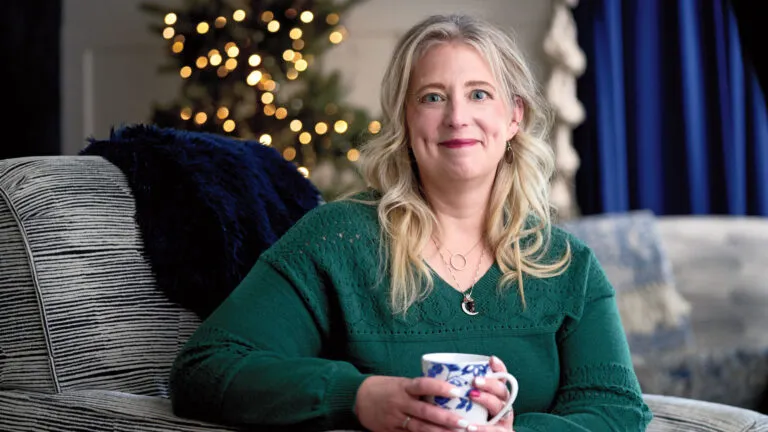The service ended that Sunday in 1996, and I trudged out of church into the torpid heat of an Atlanta summer, feeling further from God than ever.
It wasn’t the sermon or the hymns or the prayers. It was me. I was at a dead end.
I’d been a television reporter for years, working in cities up and down the East Coast. My goal had been to make it to the network level by age 35. My ultimate dream was to be on 60 Minutes someday.
But here I was, almost 36, at a local affiliate, a general assignment reporter for Atlanta’s WSB-TV. The only other job in sight was at a golf magazine. My finances were in bad shape and the golf gig would pay more than I was making. I was tempted. Really tempted.
I headed down the sidewalk, squinting against the blinding sun. I’d thought God had given me my dream, but now I wondered. How long was I going to keep banging my head against a wall? What if I never made it?
Failure was what most people expected of me growing up. I had a terrible stutter and I struggled academically—so much that I was sent to remedial classes. You can probably guess the teasing I was subjected to. “Byron’s stupid.” “His name should be Moron.”
Those taunts still drove me. I kept a tape of my worst reporting work and I watched it almost every morning, replaying my mistakes. I used it to get me going, to motivate myself to try harder. But maybe all that effort wasn’t worth it.
I glanced back at the tall brick steeple. Why hadn’t I found the comfort in worship I used to? Church was the highlight of my week when I was a kid. Sunday mornings I’d settle next to Mama into our pew at New Shiloh Baptist Church in Baltimore and drink in the wonders around me: the stunning stained-glass window framing the pulpit, the rise and fall of the preacher’s voice making Bible stories come alive, the joy on Mama’s face as she sang “His eye is on the sparrow” (so different from the weariness after a long day at her seamstress job).
Church made me happy too. It was my refuge. I didn’t stutter when I sang, and there were no teachers to call on me and make me sweat over how I was going to fake an answer. I was a scrawny kid with big glasses and an even bigger secret, a secret that didn’t seem to be such a burden on Sundays.
You see, I couldn’t read. Ten years old and I couldn’t do much more than spell my name and recognize the words “St. Katharine’s” on my school building. I was great at memorizing, and that’s how I fooled everyone. I’d get Mama or my older brother, Mac, to read me passages from my textbooks and then if a teacher called on me I would repeat what I’d heard.
I passed first, second and third grades—barely, even with Mama spending a couple hours every night going over my homework with me. She never guessed I couldn’t read. But by fourth grade, I couldn’t fake it anymore.
The school insisted I take a battery of tests. One afternoon a man came to our house with the results. I sat next to my mom and dad on the sofa, trying not to squirm. The man cleared his throat. “I’m sorry, Mr. and Mrs. Pitts,” he said. “Byron is functionally illiterate.”
My dad looked away, frowning. My mom raised her hand to her mouth, shocked. I didn’t understand their reaction until the man went on. “We don’t know why,” he said, “but he simply has never learned to read.”
My secret was out.
“Keep your head up,” Mama told me. “We’ll just work harder. We’ll spend four hours a night on your schoolwork. We’ll pray when we start, pray when we get tired and pray when we’re done.”
We worked and worked for months. I got nowhere. I was put into remedial classes that met in the school basement. All I could see were the feet of the people walking by outside, and I felt like life was passing me by too. I knew what those people thought, That’s where the dummies are sent, the losers and failures.
One day at home I was watching TV and saw a commercial for a reading program for adults. “If they can teach grown-ups,” I said to Mama, “maybe they can teach me.”
Mama called the program. Soon, a special monitor was delivered to our house. I put slides in it that displayed words, letters and pictures. Day after day I sat in front of it, trying to learn what the different letters looked and sounded like.
“I’m never going to get this,” I told Mama. “Everyone’s right. I’m a m-m-moron.”
“You’re not a moron, Byron,” she said. “Did I ever tell you about the job I had driving a tractor-trailer? I wrestled with shifting those gears every day and people laughed at me. But after I got it, no one minded about the struggle; they just saw me as a truck driver. You will do this. You just have to keep working at it.”
I did. I sat with that monitor and with my schoolbooks and sounded out words over and over. And I prayed just like Mama said—when I started, when
I finished and especially when I got tired. A simple prayer: “God, please help me read.”
Toward the end of sixth grade my teacher sent me home with a note. I called Mama and told her she had to come home immediately so I could show it to her. She sat down at the dining room table.
I stood next to her and unfolded the note. “Byron is doing much better at school,” I read slowly. “He is making p-p-progress.” I’d never seen Mama look so joyous outside of church. She hugged me hard. “Lord, thank you,” she murmured.
In junior high and high school I worked even harder. I had a lot of catching up to do, and I was determined to get into college. One of the proudest days of my life—and Mama’s—was when she dropped me off at Ohio Wesleyan University.
But I was so out of my depth I felt like I was back in fourth grade again, struggling to sound out words while my classmates were buzzing through entire books. I failed my freshman English class. The professor called me into his office.
“I’ll make this quick,” he said. “I’m sorry, but you are not Ohio Wesleyan material. I think you should leave this university.” He looked me straight in the eye. “That’s all. Good luck to you.”
I left his office, numb. Maybe I would never get out of the basement no matter how hard I tried. It would break Mama’s heart if I dropped out, but what else could I do?
I went to University Hall and picked up the forms to withdraw from school. Papers in hand, I sank down on a bench outside and burst into tears—nose-running, shoulder-shaking tears.
“Young man, are you okay?” someone asked. I looked up. A middle-aged woman was standing there.
Maybe it was the kindness in her expression, but I blurted, “I don’t belong h-h-here. I was fooling myself to think I could make it.” Everything poured out of me, what my professor had said, how ashamed I was to be failing, how stupid I felt. I was crying, sniffling and stuttering.
“That’s nonsense. Promise you will speak to me tomorrow before you make any decision to drop out. My name is Ulle, Ulle Lewes. My office is on the second floor of Slocum Hall. Please come see me at eleven.”
It turned out Dr. Lewes was an English professor. She met with me three, sometimes four, hours a week. She went over my writing assignments, correcting the grammar, punctuation and sentence structure. When I got those basics down, she made me set higher goals. “Never settle for less,” she said. “Push harder!” Dr. Lewes taught me to love the written word.
And the spoken word? The person who changed my life there was my speech professor, Ed Robinson. “How long have you stuttered?” he asked gruffly one day after I stumbled over an answer in class. “I think I can help you.” And he did, improvising as we went along. I practiced speaking with a pencil in my mouth, read Shakespeare forward and backward, sang sentences then spoke them. Dr. Robinson encouraged me to host a show on the college radio station. Oddly, I never stuttered on the air.
That’s how I discovered my calling: broadcasting. I graduated with a degree in journalism and landed a reporting job at WNCT-TV in Greenville, North Carolina. From there I’d worked my way up to TV stations in bigger markets: Norfolk, Orlando, Tampa, Boston and now Atlanta.
Yet here I was in the heat of a Georgia summer, trudging down the sidewalk after church, wondering if broadcasting was the right path after all. I was tired of worrying about how I was going to pay my bills, of telling myself, “When I get to network, everything will work out.” All those people who’d helped me, who’d believed in me, their trust must’ve been unfounded. Where had my struggles gotten me? Not where I’d dreamed.
I stepped into the intersection. Suddenly I sensed something to my right and jumped back onto the curb. A car zipped past, just inches from me. A couple of birds that had darted up from the road circled in front of me. They made me think of the words of Mama’s favorite hymn, “His eye is on the sparrow, and I know he watches me.”
In that moment I felt like a little boy sitting next to Mama in the pew at New Shiloh, praying that someday I’d be able to read, to overcome my stutter. Hadn’t that happened? Hadn’t God watched over me? And he was watching over me still. I’d been so focused on my doubts, on replaying that tape of me at my worst, that I’d forgotten who was truly helping me become the best I could be.
“God,” I said, “from now on, I’m going to trust you and your purpose for me. Not my plan but your plan.”
After that I began my mornings reading Scripture, not watching that old tape. The Bible helped me reconnect to the reasons I wanted to be a broadcast journalist—telling stories that help people, inform them and inspire them. When an opportunity came up at CBS in Washington, D.C., I was ready. And the chance to work at 60 Minutes—my dream job? That finally came too.
I keep a Bible here in my office at 60 Minutes. It’s the first thing I read in the mornings, even before my e-mail. One of my favorite passages is from Luke: “Are not five sparrows sold for two pennies? And not one of them is forgotten before God.”
Not one of us is forgotten either.
Read about which 3 books inspire Byron and why!
Did you enjoy this story? Subscribe to Guideposts magazine.




